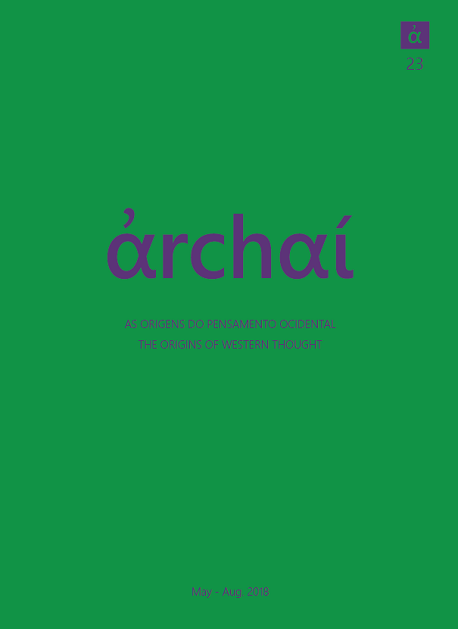Therapeutic Tables and Healthy Tables
Platonic Texts in Dialogue with Hippocratic and Gastronomic Literature
DOI:
https://doi.org/10.14195/1984-249X_23_8Keywords:
Plato, Corpus Hippocraticum, cooking, medicine, philosophyAbstract
The focus of this paper concerns two domains of daily life related to the care of the body (ἡ τοῦ σωÌματος θεÏαπείÌα) ”“ cooking and medicine ”“ both sharing a common field of intervention: food. The main goal of the inquiry is to identify points of convergence and disruption concerning those technai in a comparative study of selected passages of the Platonic dialogues and its contemporary Hippocratic treatises and gastronomic literature. The On Ancient Medicine presents the key for our analysis, by establishing that the founding principle of medicine as techne is to conceive the patient’s diet (ἡ τῶν καμνοÌντων δίÌαιτα) as a different diet from the healthy people’s diet (ἡ τῶν ὑγιαινοÌντων δίÌαιτα). Based on that distinction, we approach the perception of the several nuances of meaning assumed in distinct literary, sociological and theoretical contexts by both dietetic models (which we accordingly named “therapeutic table” and “healthy table”). The study proceeds through the analysis of passages from the following texts: Plato’s Gorgias, Protagoras, Alcibiades and Ion; Hippocratic On Ancient Medicine, On Affections, Aphorisms and On Regimen; Archestratus’ Hedypatheia; Culinary Books from the IV and III BC.
Downloads
References
DALBY, A. (1996). Siren Feasts. A History of Food and Gastronomy in Greece. London & New York, Routledge.
EIJK, Ph. J. van der (2005). Medicine and Philosophy in Classical Antiquity. Doctors and Philosophers on Nature, Soul, Health and Disease. Cambridge, Cambridge University Press.
GARCÍA SOLER, M. J. (2008). El cocinero cómico: maestro de los fogones y de la palabra. Cuadernos de Filologia Classica (Grecia): Estudios griegos e indoeuropeos, nº 18, p. 145-58.
GOODY, J. (1982). Cooking, Cuisine and Class. A Study in Comparative Sociology. Cambridge, Cambridge University Press.
JOUANNA, J. (1998). The birth of western medical art. In GRMEK, M. D. et alii (eds.). Western Medical Thought from Antiquity to the Middle Ages. Cambridge & London, Harvard University Press.
KAPLAN, D. M. (ed.) (2012). The philosophy of food. Berkeley, University of California Press.
KING, H. (1995). Medical Texts as a Source for Women’s History. In: POWELL, A. (ed.), The Greek World. London & New York, Routledge, p. 199-218.
KORSMEYER, C. (2002). El sentido del gusto: comida, estética y filosofía.Barcelona. Ediciones Paidós Ibérica.
LLOYD, G. E. R. (1966). Polarity and Analogy: Two Types of Argumentation in Early Greek Thought. Cambridge, Cambridge University Press.
LLOYD, G. E. R. (1983). Science, Folklore and Ideology. Studies in the Life Sciences in Ancient Greece. Cambridge, Cambridge University Press.
MacNAMARA, L. (2003-04). ‘Conjurers, Purifiers, Vagabonds and Quacks’? The Clinical Roles of the Folk and Hippocratic Healers of Classical Greece. Iris: Journal of the Classical Association of Victoria, nº 16-17, p. 2-25.
NOTARIO, F. (2015). Plato’s Political Cuisine. Commensality, Food and Politics in the Platonic Though. Ágora. Estudos Clássicos em Debate, nº 17, p. 123" 158.
ONFRAY, M. (1996). El vientre de los filósofos: crítica de la razón dietética. Alegia, Guipuzcoa, R&B.
ONFRAY, M. (1999). La razón del gourmet: filosofía del gusto. Buenos Aires, Ediciones de la Flor.
ROMERI, L. (2015). Regimes alimentaires et regimes politiques chez Platon. Food&Histony, nº 13, p. 165-180.
SCHIEFSKY, M. J. (2005). Hippocrates On Ancient Medicine. Translated with introduction and commentary. Leiden & Boston, Brill.
SOARES, C. (2010). História da alimentação na Antiguidade Clássica: os primeiros Livros de Culinária. Boletim de Estudos Clássicos, nº 54, p. 43-52.
SOARES, C. (2012). Arte culinária em Xenofonte, Platão e Aristóteles. In: SOARES, C.; DIAS, P. B. (eds.). Contributos para a História da Alimentação na Antiguidade. Coimbra, Centro de Estudos Clássicos e Humanísticos da Universidade de Coimbra, p. 35-47.
SOARES, C. (2014). Matrizes clássicas gregas da História da Dieta: contributos da tratadística hipocrática. In: SOARES, C. (ed.), Espaços do Pensamento Científico da Antiguidade. Coimbra, Imprensa da Universidade de Coimbra, p. 13-36.
SOARES, C. (2016a). Cozinha simples, mesa farta: os requintes da gastronomia mediterrânea grega antiga (Arquéstrato, séc. IV a.C.). In: PINHEIRO, J.; SOARES, C. (eds.). Patrimónios Alimentares de Aquém e Além Mar. Coimbra & São Paulo, Imprensa da Universidade de Coimbra & Annablume, p. 479-498.
SOARES, C. (2016b). Arquéstrato, Iguarias do Mundo Grego. Guia gastronómico do Mediterrâneo Antigo. Coimbra & São Paulo, Imprensa da Universidade de Coimbra & Annablume.
TOTELIN, L. M. V. (2009). Hippocratic Recipes. Oral and Written Transmission of Pharmacological Knowledge in Fifth- and Fourth-Century Greece. Leiden & Boston, Brill.
TEFLER, E. (1997). Food for Thought. Philosophy and Food. London, Routledge.
WILKINS, J. (2001). The Boastful Chef. The Discourse of Food in Ancient Greek Comedy. Oxford, Oxford University Press.
Downloads
Published
How to Cite
Issue
Section
License
Given the public access policy of the journal, the use of the published texts is free, with the obligation of recognizing the original authorship and the first publication in this journal. The authors of the published contributions are entirely and exclusively responsible for their contents.
1. The authors authorize the publication of the article in this journal.
2. The authors guarantee that the contribution is original, and take full responsibility for its content in case of impugnation by third parties.
3. The authors guarantee that the contribution is not under evaluation in another journal.
4. The authors keep the copyright and convey to the journal the right of first publication, the work being licensed under a Creative Commons Attribution License-BY.
5. The authors are allowed and stimulated to publicize and distribute their work on-line after the publication in the journal.
6. The authors of the approved works authorize the journal to distribute their content, after publication, for reproduction in content indexes, virtual libraries and similars.
7. The editors reserve the right to make adjustments to the text and to adequate the article to the editorial rules of the journal.



